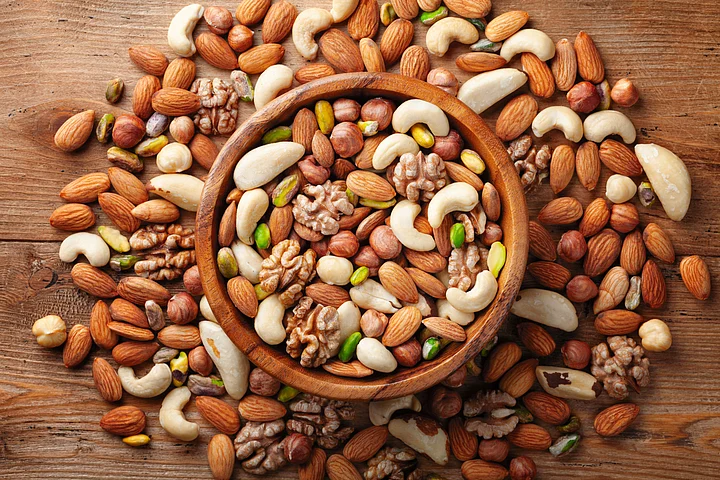Health Benefits of Dry Fruits: In the realm of nutrition, dry fruits stand as a remarkable testament to the wonders of nature's ingenuity. These concentrated morsels, crafted through the gentle process of drying, offer a treasure trove of health benefits that have captivated the hearts and palates of people worldwide. From heart health and digestive wellness to immunity support and radiant skin, the world of dry fruits unveils a cornucopia of vitality and nourishment.
Dry fruits can be preserved for longer durations compared to the fresh fruits. They can be easily carried for long trips without worrying for quality because they often don't require refrigeration. Dry fruits are loaded with vitamins, fibers, minerals, and other essential nutrients. If consumed in moderate amounts, these superfoods can do wonders for our health and well-being. Incorporating dry fruits into our daily diet can offer plethora of health benefits. Let us check out some of them below.
7 Amazing Health Benefits of Dry Fruits
Following are some of the top health benefits of consuming dry fruits.
1. Promote Heart Health: Among the myriad of dry fruits, nuts like almonds, walnuts, and pistachios shine as true heart heroes. These delectable treasures are brimming with healthy fats, particularly monounsaturated and polyunsaturated fats, which play a pivotal role in reducing bad cholesterol levels and boosting good cholesterol levels. The fiber and antioxidants found in dry fruits further contribute to reducing inflammation and enhancing overall cardiovascular health. Studies have resoundingly demonstrated that regular consumption of nuts can significantly lower the risk of heart disease, making them a must-have for a heart-healthy diet.
2. Aid in Weight Management: Contrary to popular belief, dry fruits are not fattening, but rather, they can be a valuable ally in weight management strategies. The high fiber content in dry fruits promotes satiety, keeping you feeling full for longer and reducing overall calorie intake. A small handful of almonds or a few dates can satisfy hunger pangs without leading to overindulgence. Moreover, the natural sugars in dry fruits provide a quick burst of energy, making them ideal pre- or post-workout snacks.
3. Enhance Digestive Health: Dry fruits are nutritional powerhouses that contribute significantly to digestive well-being. Packed with dietary fiber, they aid in promoting regular bowel movements and preventing constipation. Prunes, in particular, are renowned for their natural laxative properties, thanks to their high fiber and sorbitol content. Regular consumption of fiber-rich dry fruits helps maintain a healthy digestive system, alleviating constipation and reducing the risk of gastrointestinal disorders.
4. Promote Bone Health: Certain dry fruits stand out as exceptional guardians of bone health. Dried figs and apricots are rich sources of calcium and magnesium, essential minerals for maintaining strong and healthy bones. Raisins, too, contain boron, a mineral that plays a vital role in bone formation and maintenance. Incorporating these dry fruits into your diet can contribute to the prevention of bone-related diseases like osteoporosis.
5. Good for Skin Health: The vitamins and antioxidants found in dry fruits extend their benefits to skin health. Vitamin E, abundantly present in almonds and hazelnuts, nourishes the skin, maintaining its elasticity and reducing the appearance of wrinkles. The healthy fats in nuts further contribute to keeping the skin moisturized and radiant. Regular consumption of dry fruits can lead to healthier and more vibrant skin.
6. Boost Immunity: Dry fruits are brimming with essential vitamins and minerals that fortify the immune system. Cashews and almonds are rich in zinc, a mineral crucial for maintaining a robust immune response. Dried berries, such as cranberries and goji berries, are abundant in vitamin C, renowned for its immune-boosting properties. Incorporating a variety of dry fruits into your diet can help strengthen your immune system and protect against infections.
7. Help in Managing Blood Sugar Levels: Despite their natural sweetness, many dry fruits have a low to moderate glycemic index, meaning they do not cause sudden spikes in blood sugar levels. Dried apricots, prunes, and dates, for instance, have a lower glycemic index compared to other sweet snacks. The fiber content in dry fruits also aids in slowing down the absorption of sugar, making them a suitable choice for individuals with diabetes or those managing their blood sugar levels.
(Disclaimer: Parts of this article were generated by AI and published after the content was editorially modified and verified by a human based on their own judgement and expertise. The Quint does not publish AI-generated content without direct human involvement and oversight).
(At The Quint, we question everything. Play an active role in shaping our journalism by becoming a member today.)
